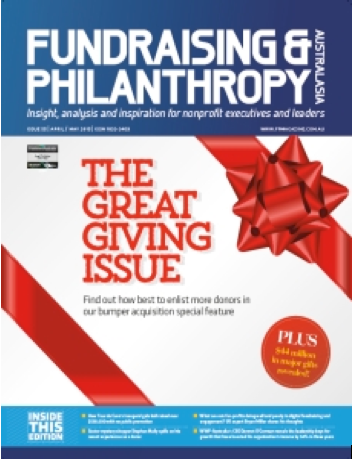Conexum Knowledge Centre: The Experts View Knowledge Share: Case Study ~ Hunter Medical Research Institute
Acquiring new donors using scored prospect names selected from the Insight Data Co-operative Database.
“I’m pleased to say that our first appeal using the Insight Data Co-op list has gone really well achieving a response rate as high as 6.35% and an ROI of $1.85.”
Julia Berry – Development Officer Marketing
Hunter Medical Research Institute
Introduction
Conexum worked with the Hunter Medical Research Institute (HMRI) to help them cost effectively acquire new profitable donors using scored prospect names selected from the Insight data co-operative database.
HMRI is a translational medical research institute based in the Hunter Region of New South Wales, Australia. Established in 1998, HMRI researchers deliver research outcomes and technology closely aligned to community health needs.
The Challenge
When HMRI’s direct mail program first started in 2009, they had some amazing results with response rates well in excess of 2%, and early appeals even had a positive ROI. However, this was focusing on their local target markets (Newcastle, Hunter & Great Lakes). Over the years, the response rate and ROI had declined, and HMRI were also struggling to get counts from within their local target markets as they had nearly exhausted their pool of potential donors (from the best performing rented lists).
Many of the lists had quite fluctuating results, which made it difficult to determine which lists to select for each appeal. Some lists also had poor data hygiene, with high rates of return to senders (RTS) and many people calling to complain the recipient was deceased.
Given the limited pool of potential donors from within their local target market, HMRI also tested a number of lists in the Greater NSW area, however the results were quite poor, and not sustainable for future appeals, yet HMRI still needed to build their donor database.
The Solution
Conexum recommended HMRI join the Insight Data Co-operative, which would enable them to access known charity donor names.
Before HMRI could contribute their supporter data into the data co-op the first step in the process required HMRI to amend their existing privacy policy to enable them to obtain consent from their existing supporters, which would allow them to share their supporters name, address and transactional information with other participating members of the Insight data co-op. To do this, HMRI simply added a new 3rd party opt-out disclosure statement on their donor appeal mailings, newsletters as well as updating the privacy policy on their website. This change request also required internal approval by the relevant stakeholders and ultimately the board needed to eventually sign off on this.
After several donor communications carrying the new 3rd party opt-out disclosure statement, HMRI were then in a position to contribute privacy compliant data into the Insight Data Co-operative. HMRI provided their entire supporter data indicating which names could be shared and which were to be used as a suppression file.
Upon receipt the HMRI data was then loaded and matched to the Insight data co-operative database. This revealed approximately 78% of the HMRI supporter names and addresses matched to the Insight data co-operative database. This meant that roughly 8 out of every 10 of the HMRI existing supporters details were already held on the Insight database. The unique/ non-matched records were then dropped, as only the multi transactor names are used within the data co-operative. A bespoke predictive scoring model was then developed and applied to the Insight data co-operative database to select scored prospect names from within the specific geographical areas HMRI was looking to target.
The file counts generated from the Insight data co-operative database revealed a new pool of potential donor prospect names was now available from within HMRI’s local market area as well some healthy volumes to test within the Greater NSW postcode areas.
“I’m pleased to say that our first appeal using the Insight data co-operative list has gone really well. The other benefit of the Insight data co-operative list was a much lower return to sender rate and deceased notification rate in comparison to the other lists.””
Julia Berry – Development Officer Marketing
Hunter Medical Research Institute
Insight Data Co-operative results based upon HMRI’s targeted geographical areas.
Newcastle
Great Lakes
Hunter
Greater NSW postcodes
4.54%
5.66%
6.35%
2.57%
$1.44
$1.71
$1.85
$0.82
The combined end result to other lists used was 1.4% and an ROI of $0.55. The combined response rate to the Insight data co-operative list was 2.8% and an ROI of $0.90. This result has now given HMRI the confidence to expand their geographical footprint in terms of targeting new prospects/ donors next year.
The results achieved from within HMRI’s traditional geographical footprint areas (Newcastle, Great Lakes & Hunter) show that for every $1.00 spent on the initial response, HMRI is making a profit of between $0.44 to $0.85 making the new donors acquired from the Insight data co-operative list cash positive from day one.
About The Insight Data Co-operative
The Insight Data Co-operative is the largest shared transactional marketing database of its kind in Australasia. Over 108 participating members across the not-for-profit, home shopping/ multi-channel retailing and publishing sectors contribute their donor and customer data into Insight.
These organisations have allowed us to build a multi-transactor universe (that being households which have donated/ purchased from two or more members) of over 2.7MM households in AU and over 450K households in NZ.
Insight Data Co-operative: delivering more profitable new donors
For more information about how Conexum can help you acquire more profitable new donors visit https://conexum.com.au or call Glenn Harrison on 1300 873 849.











